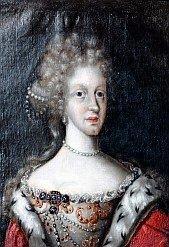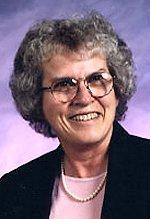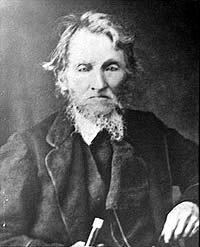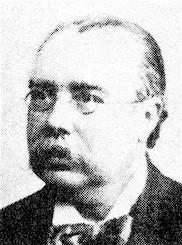Planning worship?
Check out our sister site, ZeteoSearch.org,
for 20+ additional resources related to your search.
- |
User Links
Person Results
Sidney Dyer
1814 - 1898 Author of "Go preach the blest salvation" in The Otterbein Hymnal Dyer, Sidney, who served in the U. S. Army from 1831 to c. 1840, is a native of White Creek, Washington County, New York, where he was born in 1814. On leaving the army he was ordained a Baptist Minister in 1842, and acted first as a Missionary to the Choctaws, then as Pastor in Indianapolis, Indiana (1852), and as Secretary to the Baptist Publication Society, Phila. (1859). He has published sundry works, and in the Southwestern Psalmist, 1851, 16 of his hymns are found.
The following are later and undated:—
1. Go, preach the blest salvation. Missions. In the Baptist Praise Book, 1871, and The Baptist Hymn & Tune Book, 1871.
2. Great Framer [Maker] of unnumbered worlds. National Humiliation. In the Boston Unitarian Hymn [and Tune] Book, 1868, and others.
3. When faint and weary toiling. Work whilst it is day. In the Baptist Praise Book, 1871.
4. Work, for the night is coming. Duty. This hymn is in wider use than the foregoing, but though often ascribed to Dyer, is really by Miss Anna L. Walker, of Canada, who published a volume of Poems, 1868. S. Dyer, in 1854, wrote a hymn on the same subject for a Sunday-school in Indianapolis, and hence the confusion between the two. In 1882 a cento beginning with the same stanza was given in Whiting's (English) Hymns for the Church Catholic, No. 366. Of this cento, stanzas i., ii. are by Miss Walker; and stanzas iii., iv. by Miss Whiting, daughter of the editor of that collection. [Rev.F. M. Bird, M.A.]
-- John Julian, Dictionary of Hymnology (1907)
==================
Dyer, S., p. 317, ii. Additional hymns by Dr. Dyer are given in the Baptist Sursum Corda, Phila., 1898, with the following dates :—
1. Enter, Jesus bids thee welcome. Invitation. 1883.
2. No more with horrors veil the tomb. Burial. 1897.
Dr. Dyer d. in 1898.
--John Julian, Dictionary of Hymnology, New Supplement (1907)
=================
Dyer, Sidney. (White Creek, New York, February 11, 1814--December 22, 1898, Philadelphia). Baptist. Indiana State University, honorary A.M. ; Bucknell University, honorary Ph.D. Missionary to the Choctaws early in his career. Pastorates at Brownsville, New York, 1842; Indianapolis, 1852-1859. District secretary of the American Baptist Publication Society, Philadelphia, 1859-1885. Author of eight religious books designed for children, two volumes of verse: Voices of Nature (Louisville, 1849), and Songs and Ballads (Indianapolis, 1857). Wrote a large number of hymns in Sunday School as well as church collections. In 1851, he published The South Western Psalmist (Louisville), which became known as Dyer's Psalmist. Of 467 hymns, 16 are by Dyer. Also wrote a prize-winning hymn "O wondrous land! thy onward march sublime" for the Jubilee of the American Baptist Home Mission Society which was help in New York in 1882. This 66-stanza hymn may be found in Baptist Home Missions in North America: Including a Full Report of the Proceedings and Address of the Jubilee Meeting . . . (New York: Baptist Home Mission Rooms, 1883). "Work, for the night is coming," written by Annie L. (Walker) Coghill, was sometimes ascribed to Dyer. The confusion arose when, in 1854, Dyer wrote a text on the same subject for a Sunday School in Indianapolis.
--Deborah Carlton Loftis, DNAH Archives
Sidney Dyer
Anna Sophia von Hessen-Darmstadt

1638 - 1683 Person Name: Anna Sophia, Landgräffin von Hessen-Darmstadt Author of "Wohl dem, der Jesum liebet" in Gesangbuch mit Noten Anna Sophia, daughter of the Landgrave Georg II. of Hesse-Darmstadt, was born at Marburg, Dec. 17, 1638. Carefully educated, especially in Holy Scripture and the Christian Fathers, she was in 1657 elected Pröbstin of the Lutheran Fürsten-Tochter-Stift at Quedlinburg, where she became Abbess 1680, and died Dec, 13, 1683 (Koch, iii. 549-554; Stromberger's preface, &c).
Her hymns, contemplations on the union of the soul with Christ, in the spirit of the Canticles, mostly appeared in her devotional work:—
Der Treue Seelen-Freund Christus Jesus mit nach denklichen Sinn-Gemählden, anmuthigen Lehr-Gedichten und neuen geistreichen Gesangen, abgedruckt und vorgestellet, Jena, 1658. The only one translation into English is Wohl dent der Jesum liebet [Holy Scripture], her best hymn, 1658, Appx. p. 26. The translations are: (l) "How happy they, who know and love," by Dr. G. Walker, 1860, p. 82. (2) "What joy to love the Saviour," in the British Herald, Nov. 1866, p. 363, repeated as No. 433 in Reid's Praise Book, 1872.
[Rev. James Mearns, M.A.]
-- John Julian, Dictionary of Hymnology (1907)
Anna Sophia von Hessen-Darmstadt
Robert Murray
1832 - 1910 Author of "From Ocean unto Ocean" in Christian Youth Hymnal Murray, Robert, Minister of the Presbyterian Church in Canada, born Dec. 25, 1832, is the author of "From ocean unto ocean" (National Hymn), and "Lord, Thou lov'st the cheerful giver" (Almsgiving), in the Scotch Church Hymnary, 1898. [Rev. James Bonar M.A.]
--John Julian, Dictionary of Hymnology, New Supplement (1907)
======================
Murray, Robert. (Earltown, Nova Scotia, December 25, 1832--December 12, 1910, Halifax, N.S.). Presbyterian. Study at Halifax's Free Church College yielded him a licence to preach, but instead of seeking ordination he edited (1855-1910) his denomination's principal periodical in the Maritimes, Presbyterian Witness. In its pages, and from pulpits, he strongly supported controversial causes like temperance, Sunday observance, and the Confederation of 1867 (which in Halifax was greeting with a day of public mourning). These interests are reflected in his four hymns included in Canadian Presbyterians' first Hymnal (1880)--though, as the sole native-born contributor, he attached to them only the initial "M." to avoid giving the impression of claiming equality with poets of the homeland.
--Hugh D. McKellar, DNAH Archives
Robert Murray
Jane Euphemia Saxby
1811 - 1898 Author of "Thou'rt with me, O my Father" in Sacred Songs For Public Worship Saxby, Jane Euphemia, née Browne, daughter of William Browne of Tallantire Hall, Cumberland, and sister of Lady Teignmouth, was born Jan. 27, 1811, and married, in 1862, to the Rev. S. H. Saxby, Vicar of East Clevedon, Somersetshire. Her work, The Dove on the Cross, was published in 1849. It has passed into numerous editions, and from it several hymns have come into common use. This was followed by The Voice of the Bird, in 1875; and Aunt Effie’s Gift to the Nursery, 1876. Sometimes Mrs. Saxby's Dove on the Cross is dated 1819, but in error. The compilation known as Hymns and Thoughts for the Sick and Lonely, by a Lady, London, J Nisbet & Co., 1848, although it contains several of her hymns in an altered form, is ascribed to her in error. Mrs. Saxby's hymns in common use include:
1. Father, into Thy loving hands. Resignation.
2. O Jesus Christ, the holy One. Holy Communion.
3. O Holy Ghost, the Comforter. Whitsuntide.
4. Shew me the way, O Lord. Guidance desired.
5. Thou art with me, O my Father. God everywhere.
6. Thou God of love, beneath Thy sheltering wings. Burial.
Of these hymns, Nos. 1, 3, 4, and 6, appeared in her Dove on the Cross, 1849. No. 2 appeared in the English Presbyterian Psalms & Hymns for Divine Worship, 1867, No. 840, in 5 stanzas of 4 lines. It was supplied to Dr. W. F. Stevenson in manuscript in 6 stanzas for his Hymns for the Church and Home, 1873. The additional stanza (the 4th) given in his Notes is:—
As Thou hast placed beyond my reach
Thy richest means of grace,
Teach me without them, Saviour, teach
My soul to see Thy face."
The point and meaning of this stanza is explained by the fact that this hymn "was written for one who by illness was prevented joining in the Communion." The hymn was included in The Voice of the Bird, 1875. Mrs. Saxby's hymns are very plaintive and tender. This is explained by her thus:— "I wrote most of my published hymns during a very long and distressing illness, which lasted many years. I thought probably that I was then in the 'Border Land’ and wrote accordingly." Died Mar. 25, 1898.
--John Julian, Dictionary of Hymnology (1907)
Jane Euphemia Saxby
Salomon Liscovius
1640 - 1689 Person Name: Sal. Liscow Author of "Schatz über alle Schätze" in Gesangbuch der Evangelischen Gemeinschaft Liscovius, Salomo, son of Johann Liscovius, or Lischkow, pastor at Niemitsch, near Guben, was born at Niemitsch, Oct. 25, 1640. He entered the University of Leipzig in 1660, and then went to Wittenberg, where he graduated M.A., and was crowned as a poet. Shortly thereafter he was appointed pastor at Otterwisch with Stockheim, near Lausigk, and ordained to this post April 21, 1664. He was then, on March 29, 1685, appointed second pastor of St. Wenceslaus's church, at Wurzen. He died at Wurzen, Dec. 5, 1689. (Koch, iii. 385; Rotermund's continuation of Jöcher's Gelehrten-Lexikon, iii. 1950, &c.)
Liscovius was one of the best German hymn-writers of the second rank in the 17th century. That is, though his hymns are not lacking in intensity, in depth, or in beauty of form, yet neither by their intrinsic value nor by their adoption into German common use are they worthy to be ranked with the hymns of Gerhardt, Franck, Scheffler and others of this period. They appeared mostly in his Christlicher Frauenzimmers Geistlicher Tugend-Spiegel. The preface to this book is dated April 14, 1672, and it was probably published at Leipzig in 1672; but the earliest ed. extant is that at Leipzig, 1703. Dr. J. L. Pasig pub. 51 of his Geistliche Lieder, with a short biographical notice, at Halle, 1855.
One of his hymns is translated:—
Schatz über alle Schatze. Love to Christ. His finest hymn. 1672 as above, and Pasig, 1855, p. 53. In the Nürnberg Gesang-Buch 1676, No. 509, and the Berlin Geistlicher Lieder Schatz, ed. 1863, No. 826. It is in 7 stanzas of 8 lines, the initial letters of the stanzas forming his Christian name Salomon. The translations are:—
(1) "Treasure above all treasure," as No. 441 in pt. i. of the
Salomon Liscovius
Joy F. Patterson

b. 1931 Author of "You Call to Us, Lord Jesus" in Hymns and Devotions for Daily Worship Joy F. Patterson (b. 1931), of Wassau, Wisconsin, is an elder in the Presbyterian Church who has written many texts and tunes; twenty-nine are collected in Come, You People of the Promise (Hope Publishing, Co., 1994); another collection, Teach Our Eyes New Ways of Seeing, was published in 2005 (Selah). Patterson has enjoyed a varied career as a French professor, homemaker, and claim representative for the Social Security Administration.
Sing! A New Creation
Joy F. Patterson
Lorenzo Lyons

1807 - 1886 Person Name: Laiana (Lorenzo Lyons), 1807-1886 Translator of "KE WEHE NEI KE ALAULA" in Na Himeni Haipule Hawaii Lorenzo Lyons also known as Makua Laiana, missionary to Hawaii.
Dianne Shapiro
Lorenzo Lyons
John King

1789 - 1858 Author of "When, His Salvation Bringing" in The New Christian Hymnal In H. and J. Gwyther's Psalmist, A Selection. of Psalms & Hymns, etc., Lond., 1830, there is 1 psalm version signed “J. King," and 1 psalm version and 4 hymns signed "I. King." One of the latter is "When His salvation bringing," No. 417, in 3 stanzas of 8 lines, with a chorus. This hymn is in extensive modern use. Concerning the author great, difficulty has been experienced in tracing his identity. Under date of Aug. 15, 1865, the Rev. John Gwyther informed D. Sedgwick that the signatures stood for "Joshua King, late Vicar of Hull."
In a second communication, dated Aug. 19, 1865, be writes further, "Mr. Joshua King was Curate to Mr. J. Eyton, of Wellington, Shropshire, when Mr. E. made his collection of Hymns and wrote them for his Book, but whether he published them in any other form I don't know. Mr. K. gave his Hymn Book to my brother." From the Registers of Eyton Church we find that Mr. King's name was John. He graduated at Queen's College, Cambridge, B.A. 1814; became Incumbent of Christ Church, Hull, in 1822, and died Sep. 12, 1858, aged 69.
--John Julian, Dictionary of Hymnology, Appendix, Part II (1907)
See also Joshua King.
John King
Charles Frischmann
Person Name: Charles G. Frischmann Harmonizer of "WEBB" in One in Faith
Charles Frischmann
Johannes Mühlmann
1573 - 1613 Person Name: J. Muehlmann Author of "While Yet The Morn Is Breaking" in American Lutheran Hymnal Mühlmann, Johannes, son of Hieronymus Mühlmann or Mühlmann, pastor at Pegau, near Leipzig, was born at Pegau, July 28, 1573. He studied at the Universities of Leipzig (M.A. January, 1597) and Jena, and was then for some time Saturday preacher at St. Thomas's Church in Leipzig. In 1599 he was appointed diaconus of the St. Wenzel Church in Naumburg, and in 1604 pastor at Laucha on the Unstrut. In the end of 1604 he became archidiaconus of the St. Nicholas Church at Leipzig, and, in 1607, was also appointed Professor of Theology in the University, and D.D. in 1612. He died of typhus at Leipzig, Nov. 14, 1613. (Allgemeine Deutsch Biographie, xxii. 483; Goedeke's Grundriss, vol. iii., 1887, p. 151, &c.)
Mühlmann was a staunch upholder of Lutheran orthodoxy, alike against Romanists and Calvinists. He was a great lover of the Psalms; his published sermons, as well as his hymns, are based on them, and almost his last words were Ps. lxiii., 3, "Thy lovingkindness is better than life." Wackernagel v. pp. 443-447, gives five hymns under his name, all of which are found in the Geistliche Psalmen, &c, published at Nürnberg in 1618, by J. Lauer. [The only known copy, in the Royal Library, Berlin, has lost its titlepage.]
Two of Mühlmann's hymns have passed into English, viz.:—
i. Dank sei Gott in der Höhe. Morning. The most popular of his hymns. Appeared 1618 as above, with his initials, and thence in Wackernagel v. p. 444, in 7 st. of 8 1. Also in the Unverfälschter Liedersegen, 1851, No. 443. Translated as:—
While yet the morn is breaking. A good translation of st. i., ii., v., vii. by Miss Winkworth, as No. 163 in her Chorale Book for England, 1863. Repeated in full in the Ohio Lutheran Hymnal, 1880, and abridged in the Marlborough College Hymn Book, 1869.
Another translation "Christ is the vine, we branches are" (st. vii.). By J. Swertner, as No. 438, in the Moravian Hymn Book, 1789 (1849, No. 612).
ii. 0 Lebens-Brünnlein tief und gross. Ps. lxv. Appeared 1618 as above, with his initials, in 9 st. of 9 1., entitled "a hymn from the 65th Psalm." Thence in Wackernagel v. p. 446; also in the Unverfälschter Liedersegen, 1851, No. 426. It is really a hymn on Christ as the Fountain of Life here and in Eternity, and with Ps. lxv. 10 as its motto. Translated as:—
0 spring of Life, so deep, so great. A good translation of st. i., ii., v., vi., ix. by A. T. Russell, as No. 166 in his Psalms & Hymns, 1851. [Rev. James Mearns, M.A.]
--John Julian, Dictionary of Hymnology (1907)
Johannes Mühlmann


 My Starred Hymns
My Starred Hymns

